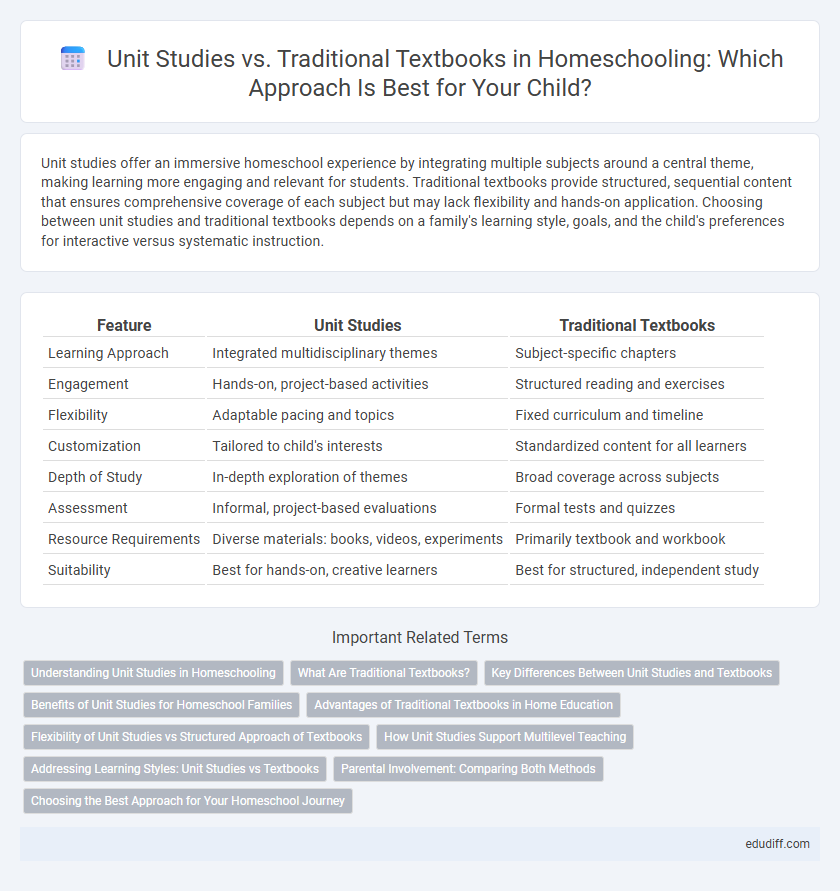Unit studies offer an immersive homeschool experience by integrating multiple subjects around a central theme, making learning more engaging and relevant for students. Traditional textbooks provide structured, sequential content that ensures comprehensive coverage of each subject but may lack flexibility and hands-on application. Choosing between unit studies and traditional textbooks depends on a family's learning style, goals, and the child's preferences for interactive versus systematic instruction.
Table of Comparison
| Feature | Unit Studies | Traditional Textbooks |
|---|---|---|
| Learning Approach | Integrated multidisciplinary themes | Subject-specific chapters |
| Engagement | Hands-on, project-based activities | Structured reading and exercises |
| Flexibility | Adaptable pacing and topics | Fixed curriculum and timeline |
| Customization | Tailored to child's interests | Standardized content for all learners |
| Depth of Study | In-depth exploration of themes | Broad coverage across subjects |
| Assessment | Informal, project-based evaluations | Formal tests and quizzes |
| Resource Requirements | Diverse materials: books, videos, experiments | Primarily textbook and workbook |
| Suitability | Best for hands-on, creative learners | Best for structured, independent study |
Understanding Unit Studies in Homeschooling
Unit studies in homeschooling integrate multiple subjects around a central theme, enhancing comprehension and retention by connecting concepts in a meaningful context. Unlike traditional textbooks that isolate subjects, unit studies promote critical thinking and creativity through hands-on activities and real-world applications. This approach aligns with diverse learning styles, fostering deeper engagement and personalized education.
What Are Traditional Textbooks?
Traditional textbooks are structured educational resources that provide sequential, grade-based content designed by experts to cover specific subjects comprehensively. These textbooks follow a standardized curriculum aligned with state or national education standards, offering exercises, assessments, and clear learning objectives. They serve as a primary tool in conventional homeschooling, enabling systematic progression through established academic topics.
Key Differences Between Unit Studies and Textbooks
Unit studies integrate multiple subjects around a central theme, promoting interdisciplinary learning and real-world connections, while traditional textbooks compartmentalize subjects into isolated lessons with a linear progression. Unit studies emphasize hands-on activities and student-driven inquiry, enhancing engagement and critical thinking, whereas textbooks rely heavily on structured content delivery and standardized assessment. This approach cultivates deeper understanding and retention through thematic immersion, contrasting with the repetitive memorization often associated with textbook use.
Benefits of Unit Studies for Homeschool Families
Unit studies integrate multiple subjects around a central theme, enhancing engagement and retention for homeschool families by providing context-rich learning experiences. This approach fosters critical thinking and creativity through hands-on activities and real-world applications, making education more meaningful compared to the linear approach of traditional textbooks. Homeschoolers benefit from the flexibility of unit studies, which accommodate diverse learning styles and family schedules, promoting a personalized and adaptable curriculum.
Advantages of Traditional Textbooks in Home Education
Traditional textbooks in home education offer structured, comprehensive curricula that ensure consistent progression through subjects, facilitating easier tracking of student performance. They provide authoritative, well-vetted content aligned with educational standards, which supports parents in delivering accurate instruction. The familiar format and organized layout of textbooks reduce preparation time and enhance focused study sessions for homeschool students.
Flexibility of Unit Studies vs Structured Approach of Textbooks
Unit studies offer unmatched flexibility by integrating multiple subjects around a central theme, allowing homeschoolers to tailor lessons to their child's interests and learning pace. Traditional textbooks provide a structured approach with sequential, clearly defined content that ensures comprehensive coverage of academic standards. This contrast highlights how unit studies adapt to individual needs while textbooks maintain consistent progression and standardized assessment.
How Unit Studies Support Multilevel Teaching
Unit studies support multilevel teaching by integrating multiple subjects around a central theme, allowing students of different ages and abilities to engage with content at their own pace and depth. This approach fosters personalized learning, as lessons adapt to varied developmental stages while promoting collaboration among siblings. Unlike traditional textbooks, unit studies create a dynamic, interconnected educational experience that accommodates diverse learning styles simultaneously.
Addressing Learning Styles: Unit Studies vs Textbooks
Unit studies offer a dynamic approach to homeschooling by integrating multiple subjects around a central theme, catering to diverse learning styles such as visual, auditory, and kinesthetic learners more effectively than traditional textbooks. Traditional textbooks often follow a linear, one-size-fits-all structure, which may not engage students who thrive on experiential or thematic learning. By aligning lessons with varied preferences, unit studies enhance retention and foster deeper understanding compared to the rigid formats of conventional textbooks.
Parental Involvement: Comparing Both Methods
Unit studies promote high parental involvement by integrating multiple subjects around a common theme, encouraging hands-on activities and personalized learning experiences. Traditional textbooks often require less active participation, with parents primarily overseeing assignments and progress tracking. This difference affects how parents engage with their child's education, influencing both teaching style and depth of interaction.
Choosing the Best Approach for Your Homeschool Journey
Unit studies integrate multiple subjects around a central theme, fostering deep understanding and engagement, while traditional textbooks offer structured, subject-specific content that ensures comprehensive coverage and sequential learning. Selecting the best approach depends on your child's learning style, homeschool goals, and the flexibility you desire; unit studies promote creativity and critical thinking, whereas textbooks provide consistency and measurable progress. Balancing both methods can optimize educational outcomes and tailor the homeschool experience to your family's unique needs.
Unit Studies vs Traditional Textbooks Infographic

 edudiff.com
edudiff.com